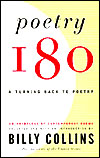 |
Billy Collins U.S. Poet Laureate (2001-2003) Dept. of English, Lehman College, CUNY
A Poetry Reading
Edited by Peter Y. Chou |
|
Preface: The first five rows were already filled when I arrived at Cubberley Auditorium
at 7:20 pm. I found an aisle seat in the tenth row and began reading Collins' Poetry 180,
an anthology of contemporary poems which he selected. This was the only Collins' book left
at the Stanford Library. All his other eight poetry books were checked out. As the U.S. Poet
Laureate, Billy Collins initiated a poem-a-day program with the Library of Congress.
Poetry 180 with its website is designed
for high school students to read a poem each day of the 180 days of the school year. The first
poem in this anthology is Billy Collins'
"Introduction to Poetry"— a wonderful way to get kids to appreciate poetry for
its freshness instead of inducing fear in getting its meaning. In this respect, Collins
has selected poems that are accessible at first glance so students will love reading them.
It's 8 pm and the auditorium is packed to capacity with students sitting on the floor in
the aisles.
Prof. Eavan Boland, Director of Stanford's Creative Writing Program introduced
Prof. Ken Fields,
who introduced Billy Collins. Fields said that Collins' poetry books outsold many fiction writers—
"Billy Collins quotes like a musician, conveys the zest of experience." Collins thanked Fields,
saying "your introduction could be broken up into poetry." Collins then read 22 poems with much
humor, drawing continuous laughter from the crowd. The audience applauded after each poem and
gave Collins a rousing standing ovation at the end. A short Q&A session followed, then several
students went up front to have their Collins's books autographed. Collins autographed the ad
with his photo in my copy of the Stanford Daily as well as the Poetry 180 which
I checked out of the Stanford Library yesterday. Here is an article about Billy Collins'
Reading from the Tuesday Nov. 11th issue of the
Stanford Daily. My notes are below. Collins' reading inspired the following
poem "Pondering About Poetry After a Billy Collins
Reading at Stanford".
|
|
(1) YOU READER I wonder how you're going to feel. the stone caught in the heart of her poet lover.
(2) MONDAY
(3) I was not afraid of coyotes or bears when I was a child.
Over the sparkle of blue waves
(4) It's been said that 300 sheep were used for Gutenberg Bible book covers.
(5) CARRY
(6) IN THE EVENING (7) THE LANYARD
(8) Yeats wrote
"The Wild Swans of Coole" [1919]. He counted 59 swans and they took off.
(9) THE INTRODUCTION
(10) I was visiting a friend living in Vermont.
(11) I took two lines from a Belgian poet and rewrote the poem:
(12) SURPRISE
(13) NO TIME
(Poetry December 2001) (14) DHARMA (spiritual destiny or nature)
The way the dog trots out of the door (15) FORGETFULNESS (16) AFTERNOON WITH IRISH COWS (17) I CHOPPED SOME PARSLEY WHILE LISTENING THREE BLIND MICE (18) JAPAN (19) TO A STRANGER BORN IN A DISTANT COUNTRY 100 YEARS FROM NOW
(20) This is a spoof poem on our obsessions to decades.
(21) ON TURNING TEN (22) NIGHTCLUB
|
|
*************************************************************************
Q&A:
Q: How do you pick a synonym if you need an 11-syllable word? *********************************************** Poetry Books by Billy Collins: (at Amazon.com)
Web Links to Billy Collins
|
![]()
| Top of Page
| Billy Collins Colloquium
| Poetry 180
| Pondering About Poetry
| Stanford Lectures |
| Poetry News
| Poetry Resources
| CPITS
| Poetry & Power
| A-Z Portals
| Home |
![]()
| © Peter Y. Chou, WisdomPortal.com P.O. Box 390707, Mountain View, CA 94039 email: peter@wisdomportal.com (11-10-2003) |
 |

